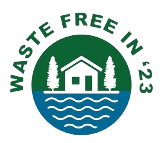In Kampala, Uganda, researchers from Wageningen University examined how processing food waste using Black Soldier Fly (BSF) larvae can impact the environment. The study focused on the carbon footprint of this method and compared it to traditional waste disposal and animal feed production. Since food waste is a major environmental issue, finding sustainable solutions that reduce greenhouse gas (GHG) emissions is crucial.
What is Black Soldier Fly (BSF) Processing?
Black Soldier Fly larvae consume organic waste, converting it into protein-rich biomass that can be used as animal feed. This method not only reduces waste but also provides an alternative to traditional feed sources like soybean meal and fishmeal, which require significant land, water, and energy to produce.
The Study’s Key Findings
The study measured carbon dioxide equivalents (CO2eq) emitted and avoided through BSF waste processing. The key findings were:
BSF larvae production emitted 3.1 kg CO2eq per kg of dried larvae.
However, it avoided 9.7 kg CO2eq, leading to a net reduction of 5.2 kg CO2eq per kg of larvae.
The process significantly lowers the carbon footprint compared to traditional animal feed production.
The research showed that replacing soybean meal and fishmeal with BSF larvae reduces environmental harm. Fishmeal production, for example, contributes to overfishing, while soybean farming leads to deforestation. By using waste to produce feed, BSF farming addresses these issues sustainably.
Environmental and Economic Benefits
1. Lower Greenhouse Gas Emissions
Traditional waste disposal methods like landfills and incineration release methane and CO2, increasing global warming. BSF treatment prevents these emissions.
The reduction in methane from decomposing organic waste is particularly important since methane is a much more potent greenhouse gas than CO2.
2. Sustainable Animal Feed Production
BSF larvae provide a protein-rich alternative to soybean meal and fishmeal, reducing the need for unsustainable agricultural practices.
Using BSF feed helps protect marine ecosystems from overfishing while freeing up land that would otherwise be used for soybean farming.
3. Improved Waste Management
Urban food waste is a major problem, especially in developing countries with limited waste management infrastructure.
By turning waste into valuable products, BSF processing promotes circular economies, where resources are reused efficiently instead of discarded.
Recommendations for Improvement
While BSF waste processing shows clear benefits, researchers suggest further efficiency improvements:
Optimizing BSF rearing conditions to enhance productivity and minimize energy use.
Investigating alternative energy sources (e.g., solar power) to further reduce emissions from the process.
Expanding research into scaling up BSF production for broader application in sustainable agriculture.
Conclusion
This study highlights BSF larvae farming as a powerful solution for reducing food waste, lowering greenhouse gas emissions, and creating sustainable animal feed. By shifting towards BSF-based waste processing, cities like Kampala can tackle both environmental and economic challenges, making waste management more efficient while supporting local agriculture.
For more details, read the full study here.
Got questions?
